Horticulture news
Company secures deal for eventual majority share in Eco Farms, a key supplier of avocados, citrus and exotics
Multinational fresh produce marketer Total Produce has made a significant investment in the North American fresh produce business with the acquisition of a 45% interest in Eco Farms, a grower, marketer and distributor based in Temecula, California.
Found in 1972, Eco Farms is primarily an avocado producer, but also grows and markets citrus as well as a range of exotics including cherimoya, dragon fruit, kumquats, kiwifruit and Asian pears.
Dublin-based Total Produce revealed the purchase at the same time as announcing strong half-year results for 2014, confirming that it had the option of acquiring further shares in Eco Farms in due course to give it a majority stake.
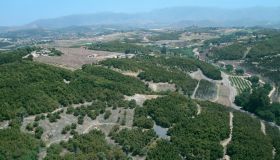
The move continues Total Produce’s expansion in North America following its recent acquisition of shares in major importer-distributor Oppy. The Irish firm currently has a 35% stake, but this is set to increase to 65% in 2017, with the price per share dependent on Oppy’s financial performance.
Elsewhere, Total Produce confirmed that its principal acquisition during the first half of 2014 was the remaining shares in Netherlands-based soft fruit specialist All Seasons Fruit (ASF), in which it already had a 50% holding.
That deal will be completed in three stages: an initial 20% shareholding was acquired on completion of the deal on 28 May 2014, with the balance to be acquired in subsequent years.
Russia’s ban on produce from EU, US, Canada, Norway and Australia leads to last-minute flurry of interest from unaffected countries.
With less than a month to go until the start of World Food Moscow, which takes place in the Russian capital on 15-18 September, speculation has been rife as to the possible impact on the fair of Russia’s ban on agricultural products from the EU, the US, Canada, Australia and Norway
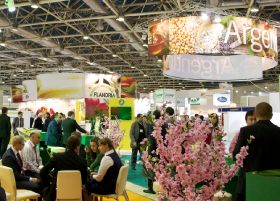
Several exhibitors from EU countries suggested that they might have chosen to attend merely as visitors this year, had they not already booked flights, hotels and exhibition space.
However, national group stands for those countries not affected by the ban, including Egypt, China, Brazil and Argentina have substantially increased their exhibiting space, according to the exhibition’s organisers, ITE Group.
Tony Higginson, ITE’s sales director, commented: “The changes in Russia’s food regulations have meant that interest from non-EU countries entering this market has increased, and subsequently we have received an influx of last-minute bookings from those countries that are not affected by the ban.”
He added that the ban had had little impact on the event’s overall exhibitor list, pointing to the fact that international companies, including those from the EU, were keen to maintain their presence on the market and to continue to develop their relationships with existing clients.
Traders at NCGM have upped their campaign to get concerns about the market redevelopment heard across social media
Angry traders at New Covent Garden Market (NCGM) have taken to social media to raise awareness of their concerns about the £130 million market development project.
A Twitter account has been set up at a delicate time in the relationship between traders and Covent Garden Market Authority (CGMA), with traders voicing concerns in the national media that their views on aspects of the project are not being heard.

One of the first tweets from the Twitter account – @GardenTenants, which represents the views of the tenants’ association – was addressed to celebrity chefs Jamie Oliver, Gordon Ramsay and James Martin, while others included the hashtag #justiceforNCG.
“We have the full support of major chefs. We expect some celebrity chefs to make a statement on this shortly,” said Gary Marshall, chair of the tenants’ association.
Barry Porter, chair of tenants at the Flower Market, said he feels traders’ concerns have not been addressed: “The meetings have been a box to tick so they can say they’ve addressed the issue,” he said. “It’s the letter of the law rather than the meaning of the word. We don’t get any information. There’s no negotiation because they’ve decided they know best.”
However, Helen Evans, CGMA business development director, emphasised that the authority’s only concern is ensuring a vibrant future for the market, and said that this is something that unites both the tenants and the authority. She added that due to the complexity of the refurbishment, the project should be looked at as a whole.
But traders have said that the authority is unaware about the importance of certain details. Concerns include insufficient parking, a lack of information about upcoming costs leading to uncertainty, and fears that splitting the fruit and vegetable market halls during the transition period will threaten the viability of businesses.
Traders at the Flower Market are concerned about a reduction in trading space, fewer access doors and loading bays, and removal of the trained ‘carrying-in gang’ responsible for unloading and registering products.
“CGMA have left a lot of professional men in limbo. We have no idea about costs,” said Marshall. But Evans stressed: “There will be a rent review in April 2015 and the rent set at that point will be held throughout the seven-year build.
Results of a survey by Ethical Consumer readers come after scandal surrounding Paul Flowers, group’s ex-chairman
The Co-operative Group has been voted the most ethical company in the UK over the last 25 years.

The results of a survey by the readers of the Ethical Consumer magazine come shortly after a scandal surrounding Paul Flowers, the group’s former chairman, who pleaded guilty to the charge of possessing cocaine in May.
It also revealed losses of £2.5 billion for the financial year ending April 2014
Ethical Consumer co-director Tim Hunt, said: “Many commentators have had their knives out for The Co-op Group in recent months. Ethical Consumer’s readers, however, are able to see through the spin and realise that despite the problems, The Co-op remains an ethical business at heart – at least for the time being.”
In order to generate capital, The Co-op Group has sold its farm business to the Welcome Trust for £249 millions.
Peter Pereira Gray, managing director of investments at the Wellcome Trust, said: “The Co-operative has its own form of ethics. We wouldn’t necessarily seek to be exactly replicating theirs. We have our own very high standards.”
Marketers reportedly having to discard stored fruit to make way for new arrivals
Southern Hemisphere topfruit suppliers are facing challenging conditions in the European market as their season enters the home straight. Chile’s iQonsulting reports that high stocks – particularly in apples – coupled with the start of the local production season in Europe is putting mounting pressure on prices.
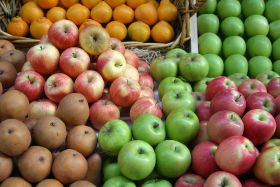
“Stored fruit is being finished off to make way for the new season crop. In pears we’re already seeing volumes from Spain and France, while in apples the first Royal Gala and Elstar are starting to come through,” said Isabel Urrutia of iQonsulting. “With European volumes set to rise considerably over the next two weeks, competition during the final stages of the Southern Hemisphere season will be fierce.”
In pears, where stocks are relatively low, a 12.5kg carton of Pakham’s from South Africa is fetching around €7, while Chilean and Argentinean fruit is selling for an average of €10 per 18kg carton.
Stock levels for apples are higher, however, with fruit still available from Argentina, Chile, South Africa and Brazil. Royal Gala and Chilean Granny Smith are currently faring worst, averaging €10 per 18kg carton. Other varieties, such as Fuji, Cripps Pink, Braeburn and Red apples were seeing prices closer to €15 per 18kg carton. While larger sized apples from South Africa are also averaging €15 per 18kg carton, smaller sizes are faring as badly as Chilean fruit.
The situation has got so difficult that in some cases marketers are opting to throw stored fruit away to make room for new season arrivals, Urrutia said.
Ex-Tesco finance director Andrew Higginson will take over on 1 October when Sir Ian Gibson retires
Morrisons has appointed Tesco veteran Andrew Higginson as its next chairman.

Higginson will take over on 1 October following the retirement of Sir Ian Gibson, amid speculation that his arrival could pose problems for the beleaguered current chief executive, Dalton Philips.
Higginson spent 15 years on the Tesco board during years of rapid growth, as finance director and later as chief executive of the retailer’s online and bank divisions. He left in 2012, shortly after previous Tesco boss Sir Terry Leahy.
He is currently chairman of home shopping group N Brown. On Tuesday (29 July) he stepped down as chairman of the recently floated Poundland when his new role at Morrisons was announced.
Poundland’s senior independent director and former Sainsbury’s finance chief Darren Shapland replaces him.
Higginson joins Morrisons amid a continuing sales slump. The latest Kantar Worldpanel data shows that Morrisons now has an 11% share of the market, down from 11.6% a year ago.
It posted an annual loss of £176 million in the year to February, and in June announced it was cutting 2,600 jobs as part of a drive to modernise the way its stores were managed.
Morrisons has said it is investing £1 billion over three years as it cuts prices to compete, and its online shopping platform is growing in size and scale.
Producer association ProCitrus says shipments to all markets will rise as a result
Peruvian citrus exports are set to reach 115,000 tonnes this year, an increase on 20% on 2013, according to citrus growers association ProCitrus. This is double the increase originally forecast by the association earlier this year.
ProCitrus CEO Sergio del Castillo said the estimate was revised in the light of more accurate estimates being available on output, fruit sizes and export volumes.
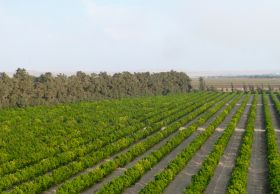
“ProCitrus makes an estimate after the physiological fall of the various varieties in December, but sometimes these estimates are somewhat imprecise and we have to wait until April or May to see how the fruit evolves after the summer,” he told Andina.
Del Castillo added that the higher volume would mean more fruit being shipped to all markets.
The sharp rise in Peruvian citrus exports in the first six months of 2014 is partly due to the increase in shipments of early season varieties. “Last season, domestic prices were higher during the early part of the season than on international markets, so many growers channelled their production to the local market,” del Castillo, told Fruitnet. “This year has seen a significant rise in output which, coupled with the earlier than usual start to the season, has resulted in far higher volumes going for export.”
Peru is the fourth biggest citrus producer in the Southern Hemisphere, with some 60,000ha generating more than 1m tonnes annually. Of this, only around one-tenth goes for export, the rest being consumed domestically both as juice and fresh.
Europe and Canada are the biggest export markets, however companies are now looking to increase mandarin shipments to Asia. “We’re hopeful that in 2015 the phytosanitary protocols will be established for shipments to Japan,” del Castillo said.
A reduction in EU imports from Turkey, Argentina and South Africa meant strong demand for Spanish fruit
A bumper harvest, coupled with lower volumes arriving from Southern Hemisphere suppliers and Turkey, helped push Spanish lemon exports to a new record this season. According to the latest figures from lemon and grapefruit interprofessional Ailimpo, shipments increased by 7% to 560,000 tonnes during the 2013/14 campaign.
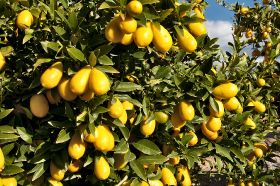
With Argentine production down by 50%, and South African shipments hit by stricter phytosanitary controls in the wake of the citrus black spot outbreak, demand across all European markets was buoyant. As a result of the strong prices, Ailimpo said it had been a profitable year for growers.
Shipments to the UK, France and Italy registered double-digit growth, rising by 25%, 16% and 13% respectively. In total, the European Union absorbs around 90% of Spain’s export total. Ailimpo said sendings to non-EU markets had also risen sharply, notably in Canada and Brazil.
A decision by Turkey to target a greater share of its export volume to eastern markets such as Russia and Ukraine also boosted demand for Spanish lemons this year.
Lemon production reached 970,000 tonnes this season, an 18% increase on last year’s total. Fino accounted for 72% of this total and Verna for the remaining 28%.
Ailimpo said investments in improved farming techniques had resulted in higher yields and better quality this season.
New funding released by Defra will boost nine horticultural agri-tech projects support growth in agri-science sector
Several fresh produce research projects will receive £12.1 million in government funding, it has been announced.
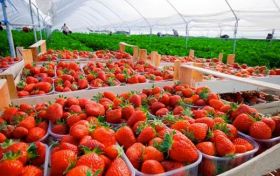
Out of the 15 agri-tech Catalyst Award winner, nine are within horticulture and five are specifically centred around fresh produce.
Defra said the investment will help support growth in the agricultural science and technology sectors in the UK.
The winning horticulture agri-tech projects were:
– ‘New strawberries optimised for growing without soil’, run by East Malling Research, Agrovista, Botanicoir, CPM Retail and Sainsbury’s.
– ‘Antimicrobial technology to control disease in potato production’, run by, Advanced Pest Solutions, Agrico, Branston, McCain Food, Science and Advice for Scottish Agriculture (SASA) and Scottish Agronomy.
– ‘Using light to extend the shelf-life of fresh produce’, run by Finlay Flowers, Adas, Lambda Photometrics, May Barn Horticultural Consultancy, North Bank Growers, Nutricycle, University of Nottingham and Wight Salads Group.
– ‘An automated system for precision application of fertiliser and plant growth compounds’, run by Growhow, Adas, Chris Harry-Thomas Consulting, Hill Court Farm Research, Patchwork Technology, Precise Crop Nutrition and Syngenta.
– ‘Developing technology for an organic natural based pesticide’, run by Hockley International, Almac Sciences and Bangor University.
– ‘Improving efficiency and reducing environmental harm of fertiliser production’, run by ITM Power, BPE Design and Support, Fera, University of Sheffield and Waitrose.
– ‘Increasing the efficiency and quality of strawberries grown without soil’, PlantWorks, Agrovista, Berry Gardens and East Malling Research.
– ‘Protecting peas and beans from beetles without blanket insecticide spraying’, run by Processors and Growers Research Organisation, BASF, Exosect, Oecos and Rothamsted Research.
– ‘Optimising “big data” to drive improvements in crop production and utilisation’, run by Produce World and Cranfield University.